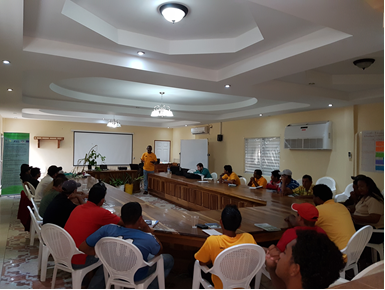

A cover crop (also called ground cover or cover plant), is a crop planted to manage soil erosion, soil fertility, weeds and/or pests, and thereby reduce the use of herbicides and pesticides. The practice consists in planting a species that does not negatively affect banana production and prevents the growth of weeds. These could be domesticated crops or local species. Bananas can also be planted on the mulch of a previous cover crop (such as Brachiaria decumbens or Crotalaria). The mulch will limit the growth of weeds and protect the young banana plants.
In keeping with the Technical Capacity Building for “Upgrading farmers and technicians agronomic and diagnostic skills under the framework of good agronomic practices”, on July 16-17, 2018, a two-day workshop on the benefits of using cover crops and practicing land fallow delivered by Mr. Derek Charles, National Specialist from the IICA Delegation in Grenada. Participants were taught on identifying varieties of cover crops including local varieties in order to familiarize themselves with seedlings and seeds from some plants that are being used as cover crops in vegetables and banana production. Twenty-six persons including, farm managers, technicians and extension officer from the Ministry of Agriculture, attended the training.
More information:











